
Film Music Editor: Ian Lace |
||
October 1999 Film Music CD
Reviews |
|
|
![]() COMPETITION WIN
a CD of your Choice
COMPETITION WIN
a CD of your Choice
![]()
Basil POLEDOURIS The Blue Lagoon Original score conducted by the composer
SOUTHERN CROSS SCCD 1018
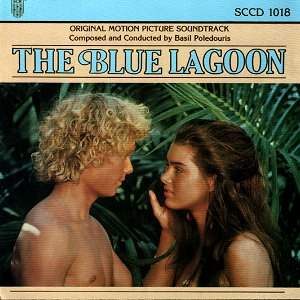
This is one of Poledouris's earliest commercial scores and one of his most effective. I recall seeing the film (Brooke Shields and Christopher Akins discover young love on a sanitised desert island) when it first came out in the cinema. I was struck then by the quality of the music, especially the main title with its salt-soaked sea-witchery.
The music ranges over a landscape that takes in hot-house sentimental piano concerto (Emmeline) material; bird and animal cries (The Island is one of the most impressive tracks), the glories of woodwind at high noon and a pan-cinematic idyllic eloquence. As the notes concede, the main titles seem frankly indebted to the theme from Mario Nascimbene's The Vikings.
The short playing time of the disc is off-set by some fine music. The only weak track in this rather excellent disc is the treacly The Kiss. There are decent concise notes by Clyde Allen. Recommended (despite short playing time and the discreet presence of some analogue hiss) for all those who warm to Poledouris or who enjoy a good saline helping for the marine romantics.
Reviewer
Rob Barnett

Jerome MOROSS The Cardinal Original score conducted by the composer
PREAMBLE PRCD 1778 [36:26]

Jerome Moross must be regarded by many as a one-score composer. Everybody remembers him for The Big Country, which must figure in most people's lists of favourite film compositions. But, of course, he wrote for other films including: The Proud Rebel and The War Lord. (Moross had also been a leading orchestrator of film music working on important assignments such as Hugo Friedhofer's exquisite score for The Best Years of our Lives - also available on Preamble PRCD 1779) Of these other scores, arguably the best is The Cardinal. Otto Preminger's 1963 film, starring Tom Tryon, traced the career of a Boston-born Catholic priest, Stephen Fermoyle, to the position of cardinal by way of being a Rome diplomat and a fighter of the Ku Klux Klan. The film was set in Rome, Vienna and America.
Moross's score embraces a wide variety of musical forms, thus maximising listener interest. The Main Title music open with deep tolling bells of the churches in Rome as we see Fermoyle walking to his investiture as cardinal. The music has an imposing ecclesiastical majesty but it also has a human, almost American folk-music dimension, appropriate to the drama that will unfold. Appropriate too, to its setting, is a hint of the influence of Respighi both in the context of that composer's Roman trilogy and his ancient church modal music.
The 'Stonebury' cue is a sparkling pastoral scherzo as Fermoyle, as a young man fresh from his studies in Rome and sent to duties in Vermont, is driven across snow-covered fields to his church. His arrival there signals a change in the music to a more solemn theme. There is then a complete change of mood for the dance hall music (Fermoyle is looking for his run-away sister). After an upbeat Dixieland jazz number, we hear a very sexy, sleazy tango.
'The Cardinal's Faith is a simple homely nostalgic theme that almost borders on a pop tune. It is nevertheless most affecting. It is interrupted by more dramatic suspenseful music as Father Ned Hailey (Burgess Meredith) dies of multiple sclerosis. After the First World War, another attempt is made to find Fermoyle's sister and we have another source tune, a saucy vaudeville song, 'They Haven't Got the Girls in the USA' (like they have in Paris).
The scene shifts to 'The Cardinal in Vienna' and to an extended six-minute cue which is a homage to the Viennese waltz. It begins as a sweet sentimental waltz for orchestra before the texture is thinned to just a trio of violin, piano and cello playing salon music very much of the era. The music then becomes gay (in the good old fashioned sense of the word) but ends on a rather poignant nostalgic note. Throughout this cue, Moross's writes some glistening material for solo violin. The cue also includes a subtle echo of Morros's The Big Country score.
'Annemarie' is served initially with a Broadway review number which is later inflated to a full orchestral version of this attractive waltz. 'The Cardinal's Decision' reflects Fermoyle's mental turmoil as he agonises over his choice between the Church and Annemarie. It is a very effective and affecting vignette. And again The Big Country score is recalled. 'Way Down South' takes us back to America and the Deep South. This is a very Americana theme played on clarinet over a sort of hoedown rhythm on strings with the theme, which closely resembles material from Aaron Copland's Appalachian Spring, then taken up by solo flute.
The final 'The Cardinal Themes' includes an arrangement of Annemarie's theme not heard in the film.
Preamble are to be congratulated in releasing this melodic and memorable score which, incredibly, was overlooked for an Oscar nomination.
Reviewer
Ian Lace

David SHIRE The Taking of Pelham One Two Original score conducted by the composer
RETROGRADE FSM-80123-2 [30:19]
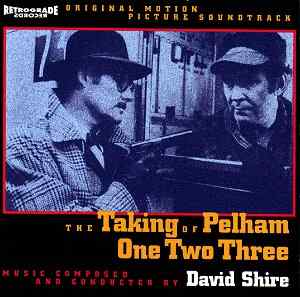
The Taking of Pelham One Two Three (1974) was a memorable, superior thriller in every way, with inspired casting and expertly paced direction by Joseph Sargent. Robert Shaw was master-villain Mr Blue, arguably his best role, supported by Walter Matthau as a laconic wise-cracking transit cop and Martin Balsom as the demoralised yet sensitive Mr Green. The plot revolves around the hijacking of a New York subway train and the holding to ransom of its passengers - "We are going to kill one passenger a minute until NewYork City pays us one million dollars."
For the film David Shire produced a brilliant innovative score which blended 20th Century twelve-tone music with early 1970s pop/jazz/funk music. The result was a composition that was not only very supportive of the screenplay but also approachable and interesting to the ear as music in its own right.
Shire envisioned a score that would be New York jazz-orientated and hard edged echoing the brash business of the City. For Pelham, he created a tone row in which the intervals give one the impression of progressive jazz sonorities. From this basic material he created a theme over a repeated bass line which would suggest organised chaos "rooting this chaos in an aggressive and very tonal bass ostinato, suggestive of the New York rhythmic drive that somehow holds the chaos together." Furthermore he cleverly orchestrated the music so that it could be heard over the clamour of the subway train. Although he used an ensemble based on a big band, he de-emphasised his middle range instruments and accentuated the high end (upper reeds, keyboards and trumpets and the low end (low bass and woodwinds, low strings and the rhythm section). He also added an ethnic percussionist and two drumset players to emphasise the cosmopolitan flavour of New York and the passengers of the train.
The score pounds along with great drama and intensity. An exciting ride and a thrilling musical experience.
Reviewer
Ian Lace

John BARRY Monte Walsh Music composed and conducted by John Barry
FILM SCORE Silver Age Classics FSM Vol 2 No. 4 [61:20]
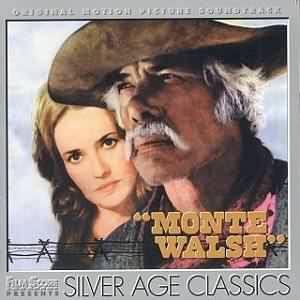
There appear to be two main schools of thought when it comes to producing a soundtrack album. The first is to make an entertaining disc which stands alone irrespective of the film, the second to produce what is effectively an archival document, including as much music from the film as possible.
This enterprising release, part of Film Score Monthly's series of Silver Age Classics, attempts to combine both approaches. Thus the first 14 tracks, play like a normal soundtrack album, presenting the best of John Barry's score almost in the order it appears in the film. A note explains that - 'a complete chronological album would be terribly redundant and would sap this beautiful music of most of its power'. The second half of the disc consists of source music, outtakes, and alternative recordings of the title song. The approach works well, offering a conventional uninterrupted John Barry album, with the bonus material (which is unlikely to be played as often) presented separately. The booklet, with notes on the film by Pete Walker and Geoff Leonard, and on the music by Lukas Kendall, is likewise a model of presentation.
Monte Walsh was a 1970 western (based on a novel by the author of Shane), starred Lee Marvin, Jeanne Moreau and Jack Palance and was directed by William A. Fraker. The film, which is generally considered to be either a depressing bore, or a beautiful elegy to the dying of the West (and the western), had limited release and was a commercial failure. No soundtrack LP was ever issued, making this limited edition CD the first legitimate issue of what has come to be considered by John Barry fans, a lost classic.
The album opens with the song 'The Good Times are Comin', a deceptively optimistic number sung by Mama Cass (Elliot) of the Mamas and the Papas pop group. Barry wrote the song with lyricist Hal David (with whom he also co-wrote Moonraker and 'We Have all the Time in the World' from On Her Majesty's Secret Service), and while it is an appealing number, it is not one of Barry's best songs. The score itself is stronger, as is built around four basic themes. The first is an instrumental version of the title song, then there is an attractive love theme, a playful comedy theme and a rather more sombre and poetic melody to portray the melancholy "loss" which features so much in the film. There is little action, but when it arrives in Sit Him High it prefigures the dark foreboding the composer would bring to his much under-rated score for the 1976 remake of King Kong. The melodies are accomplished and well crafted and the sound is fairly good - though in mono, a fact about which the packaging is reticent. I am sure it all works very well with the film and it makes for an enjoyable CD, but it is a little too low key to be considered really essential Barry when taken out of context.
The bonus material consists of two more versions of the song (there are also two other versions besides the main title in the film itself), an 'Extended Version' and a 'Single Version' - the only track in on the disc in stereo. If only for the improved sound quality, this version is the most enjoyable. 14 minutes and 48 seconds are devoted to The John Barry Saloon, 6 source pieces of jangly and repetitive saloon piano music, which I doubt any but the most dedicated Barry fan will listen to for long. The 'Score Outtakes Suite' is a single seven minute track not of material dropped from the film, but left out of the first part if the album. It consists of mainly very short arrangements of the four themes, and is nice to have but adds little to what has gone before.
The conclusion has to be that this is a good, attractive score, which has been immaculately presented. I rather doubt though, that had it not come from such a popular and collectable composer as John Barry whether such pains would have been taken to produce this disc. Certainly this must be considered a definitive release, though ultimately it is an album for the Barry fan who has everything else already
Reviewer
Gary S. Dalkin

Elton JOHN and Tim RICE The Lion King Original Broadway Cast
Edel 0104552DNY [65:10]
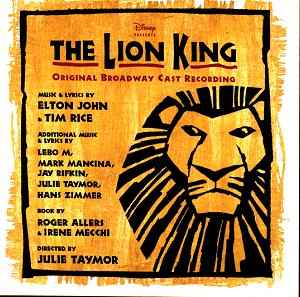
I must declare from the outset that I have seen neither the film nor the show.
As a musical experience this disc represents a very mixed blessing. Of course the whole event is in brilliant punchy sound. As a keepsake of a show the disc is highly desirable. The show must be a tour-de-force of imaginative design inspiration. Look at the giraffes on the back cover of the full text insert … and look again. However the music is such a mish-mash.
Some tracks are quite stunning. The 'African' tracks (Circle of Life, Grassland Chant, Lioness Hunt) survive best although if you enjoy this music you might well go for other CDs devoted to ethnic material. The Morning Report is just draining (sub-G&S material) as is the soft-core pop of Chow Down and I Just Can't Wait. They Live In You blends an attractive ballad with African chants. Be Prepared a sinister and amusing tango-ballad. Hakuna Matata and The Lion Sleeps Tonight ('Wímmaway') are the popular highlights. They are done with great style. In fact everything is done very well but it is all so diffuse and the stylistic clashes are un-nerving rather than peppery. Much of the pop material is drab.
My 14 year old daughter, who loved the film and songs from the original soundtrack, thought that this recording was pretty good. So, if you like the music and want a slightly different take on it this is the disc for you. If you are not a fan then this will not convert you and I remain obstinately unimpressed by all but a couple of the songs.
(as music)
(for those who like the show in the first place)
Reviewer
Rob Barnett
.
Trevor RABIN Deep Blue Sea OST
WARNER 9362-47485 [59:24]
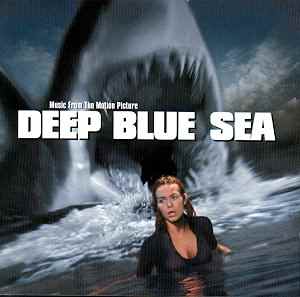
This review will be very brief because I want to establish a point of principal. Film Music on the Web is interested in 'symphonic/orchestral scores' not Pop/rock-based scores. This soundtrack album comprises for the most part source music that comes into the latter category. There is a cue (tacked on to the end as though an after-thought) named 'Deep Sea Montage,' which is an orchestral suite with a considerable synth stiffening by Trevor Rabin. The music is a stormy seascape with its waters lashed by the great white shark. This unremarkable suite lasts only six minutes and therefore renders this album not recommendable - unless you happen to like the murmurings of the likes of LL Cool J, F.A.T.E. and other exotic sounding artists blasting out their tortured rhythms.
Reviewer
Ian Lace.

Michael KAMEN The Iron Giant plus a disproportionately large amount of source music RHINO R2 75943 [41:21]
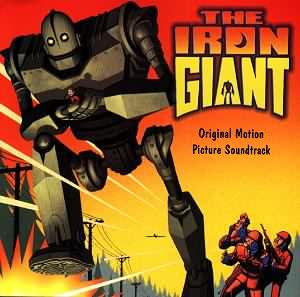
The same remarks I made about Deep Blue Sea apply here too - for only some eight minutes is devoted to Michael Kamen's music. This is just another example of an unfortunate trend and another concession to the more lucrative 'pop' market. As you will notice Kamen is not even mentioned on the front cover of the booklet and only at the end of the string of source music cues that makes up the major part of this album.
This is a pity because Kamen's music is appealing. It says nothing new but it is nonetheless very well crafted as we have come to expect from this composer. It blends quicksilver charm and magic with more solid and lumbering tones to depict the Iron Giant a sort of metal King Kong. There are also the obligatory children's high spirits, martial, noble and homely elements included. For Kamen's ridiculously under-appreciated contribution -
Reviewer
Ian Lace.

Collection: Famous Classical Chinese Film Themes 1 City of Prague Philharmonic
SILVA/GUTS SS21065 [57:12]

Although the SILVA SCREEN logo appears on the artwork of this album it is not an actual SILVA release. It was recorded by SILVA SCREEN in a specific commission for Rock Records of Taiwan - hence the featuring of Taiwanese film music. (Rock licenses products from SILVA for distribution in the Far East.) Rock Records chose all the material for all the tracks. The album ventures into a musical world which is, despite the title, from a Western perspective, largely unfamiliar. Of the 12 films featured, only two Farewell to my Concubine, and A Chinese Ghost Story received any notable UK distribution, while one or two of the other titles have appeared on late night television. The album is therefore most welcome, presenting as it does some most attractive music which many listeners would doubtless otherwise miss.
I happen by rare chance to have the soundtrack album for A City of Sadness, so I can confirm that the version on this new album is very much an arrangement of the theme. The piece has been extended and orchestrated in rich and lavish colours, and wonderfully attractive it is too, with a long, arching melody, something along the lines of The Last Emperor. I can only therefore assume that the other pieces featured here have been similarly re-arranged. I say assume, because unhappily there is no English language information about the music other than a list of the titles and the films they come from. [I understand that Rock Records brief to SILVA SCREEN was to have the songs arranged for full symphony orchestra in a combination of "John Barry meets Classic Rock" style, whilst still retaining the characteristics of the original songs - editor].
The jewel-case comes inside a cardboard slipcase, with an oversize booklet akin to those found with some upmarket classical releases. The booklet contains a lot of writing, in both Chinese and English. As well as a long introduction not translated into English, the Chinese text includes separate notes about the films and/or the composers. However, the English notes say nothing about either. Nowhere on the entire package are the composer's names even given in English. There are detailed biographies (complete with colour photographs) of the album's producer and two conductors (whose names change between the cover and the booklet) but there are no details about the Chinese/Taiwanese composers. [The booklet was prepared by Rock Records and we understand that SILVA SCREEN did not participate at all in this process, not even proof checking which would have caught the hilarious miss-spellings of Nic Raine! The exclusion of details about the composers but inclusion of details about the SILVA production team was determined by Rock Records - editor]
The surprise in the second track, the 'Main Title' from C'est La Vie, Mon Cherie, is that it sounds entirely Western, both in composition and orchestration. It is a gorgeous saxophone-led waltz, almost the sort of thing John Barry might written had he scored Murder on the Orient Express. If this is faithful to the original it demonstrates how Western musical forms have been assimilated into Oriental music, while, rather oddly, the melody re-appears in the track 'Bygone Love' from Farewell to my Concubine. Several other tracks have no especial 'Chinese' sound, while 'Blue Sea Laughter' from Swordsman is perhaps more expectedly 'oriental', offering lyrically pastoral harps and wooden flute, and 'Actress' from Burial of Heart movingly combines East and West.
Throughout, this album has a luxurious, sumptuous sound, with every track distinctly melodic (sometimes melodramatically so) and enjoyable in its own right, offering an answer to those who argue that modern films no longer have memorable themes. Here is a whole disc full of memorable, rapturously romantic, haunting and uplifting 'big' film tunes. They may not be 'authentic', but they combine to make for an immensely enjoyable hour of listening. Roll on volume 2, this time with the composer's credited and some decent English language notes.
Reviewer
Gary S. Dalkin

Collection: EVERGREEN - Music from the Films of Barbra Streisand SONIC IMAGES 828-278-909-2 [48:01]
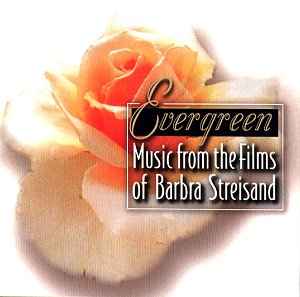
Music from:
Funny Girl The Way We Were
The Mirror Has Two Faces
On A Clear Day You Can See Forever
The Eyes of Laura Mars
A Star Is Born
The Prince of Tides
Nuts
YentlThis is a welcome all-instrumental tribute to Barbra as multi-talented singer, actress, screenwriter, director and composer.
The most extended and impressive track is the final Yentl Suite for Harp and orchestra from music by Michel Legrand, Marilyn Berman and Alan Berman. It features Le Grand Orchestre Symphoniqe conducted by Legrand and the luminous playing of talented harpist Catherine Michel. The Suite is sweetly and nostalgically meditative, romantic and passionate, and wildly exuberant. It even climaxes with a very Ravelian Bolero. Harp and orchestra are nicely balanced and the arrangements and orchestrations scintillate.
I wish I could be as enthusiastic about the opening medley from Funny Girl played by the Orchestra of the Americas which make the material sound oddly flat-footed. This music deserves much more zing than this. The City of Prague Philharmonic fare better in their six contributions: The Way We Were (Marvin Hamlish's well-loved melody and celebrated in suitably warm sentimental style); The Mirror Has Two Faces (another winning colourful and atmospheric score with some dramatic dissonances by Marvin Hamlisch); On A Clear Day You Can See Forever (again a warmly romantic approach); James Newton Howard's lovely music for The Prince of Tides (same comment although the OST album has the edge); A Star is Born (the lovely Evergreen melody) and The Eyes of Laura Mars (in contrast this is a more gritty dramatic score for this thriller). What was Babs's connection with this film? She sang the Main Title song.
Finally I would praise the contribution by John Beale - his arrangement and production of the end credits music for Nuts - a brief but atmospheric and emotionally charged work for piano and orchestra.
Reviewer
Ian Lace

and another view from Helen San
It's been said, "You either love Barbra Streisand or you don't." The same can probably be said of Evergreen, Sonic Images' latest release of the best selections from her movies. The compilation enjoys a strong, emotionally cohesive theme, brewing with the same lofty, romantic-dramatic yearnings and awakenings as Streisand's characters and stories. In a manner of speaking, this is very much a "chick flick" collection, one for eternal romantics and sensitive aspirants. From the first track, "Funny Girl" to the last, "Yentl," the album dances to sweeping, orchestral rhapsodies for the heart. And despite the fact that the album revolves around the diva, all tracks are completely instrumental, with no vocals whatsoever.
Each track is a superb selection of each score. Melodic, thematic, rich, these excerpts only leave you wanting more. Of course, the cultural icons, "The Way We Were," and A Star is Born's "Evergreen," connect immediately. But it is the other cues that make this album a prize. The Funny Girl "Medley" is an especially spirited track with a broader range. John Beal's artful performance of Nuts is one of the more subtle and quietly seductive cues on the album. The best track is possibly "Prisoner" from The Eyes of Laura Mars , a luminous saxophone theme that flawlessly textured with sensational strings. And Yentl score fans hit the jackpot with the comprehensive orchestral score suite that is not available on the Yentl soundtrack.
The performances, mainly by The City of Prague Philharmonic, are elegant. However, though the orchestral sound is good enough, but it feels somewhat simple, as if the orchestra could have been larger or fuller. Certainly, fans of these scores should get the complete versions if possible. Until then, this is a terrific sampler of some very excellent scores.
Reviewer
Helen San

We are grateful to Helen San (www.cinemusic.net) for giving us permission to include this review which is currently appearing on her Film Music site.
Collection: Glen Gould at the Cinema (music by Bach, Richard Strauss, Sibelius and Scriabin) SONY SK66532 [76:26]
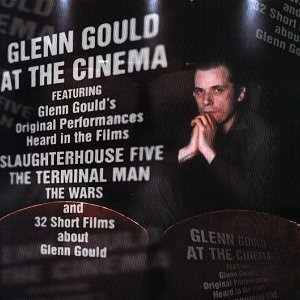
J S BACH Piano Concertos 3 and 5; movements from Goldberg Variations; Brandenburg Concerto No 4 (Slaughterhouse Five), Prelude and Fugue No. 1; (Aria) Art of the Fugue excerpts; (The Credits) English Suite No. 5 (Gould meets Gould).
RICHARD STRAUSS Funf Klavierstücke Op. 3 No. 3 (The Wars)
BRAHMS Two Intermezzi (The Wars)
SIBELIUS Sonatina No. 2 (Solitude)
SCRIABIN Deux Morceaux Op. 57 No. 1 (Personal Ad)
Glenn Gould (piano and in Art of the Fugue, organ)
with Columbia SO/Valdimir Golschmann in the two concertos
The abiding impression left by Gould's music-making is one of hypnotic concentration pliably and unshakeably commanding the listener's attention. Gould's reputed eccentricities seem distant, irrelevant or are an aspect of his communicative power.
There are many familiar friends here and the two concertos are as fresh as new-mown grass and summer mornings. All is bright, alert and new-minted. If there is one track to sample it is Variation 25 from the Goldberg Variations (Track 5).
Amongst the unfamiliar there is the Sibelius sonatina from a collection released long before Sibelius's piano music attracted recorded intégrales from BIS and Naxos. Also present are two Scriabin pieces and the surprisingly affecting Largo from Richard Strauss's Op. 3 collection. All credit to the much maligned man for turning to the un-considered or 'discredited'. I do recall that one review of the original Sibelius LP condemned Gould for distortions of the score and Kyllikki (not included here) seems to have suffered.
The film music connection (identified in brackets in the headnote) is that these pieces were used in film soundtracks including the 32 short films (1993) about Glenn Gould. However cinematic links are simply a peg on which to hang a newly cross-cut anthology from the Sony-CBS archives.
Whatever the linkage for this anthology much enduring joy can be tapped from this resounding collection of pianism blown along by the fierce flame that was Glenn Gould.
A well documented disc. Sound quality, though always hardy and solid, shows its age but not disagreeably.
A strange confection but one with many rewards to be quarried by a listener open to her or his own judgements rather than the received 'wisdom' of the critical world.
Reviewer
Rob Barnett

Return to October index [Part 1] [Part 2] [Part 3]
COMPETITION WIN a CD of your Choice

Search the Crotchet database from here
Discs on these pages are offered for sale. There is also a page of search engines from a selection of on-line retailers here.
Please support this web-site by buying your discs here.
Disclaimer: Every effort is made to make sales links to the correct disc but, in the end, you must take responsibility for checking that what you are purchasing is what you want. Some of these discs were not actually available for sale at the time of posting but a link has been made in anticipation of their forthcoming availablility.
Return To Film Music on the Webe-mail: info@musicweb.uk.net